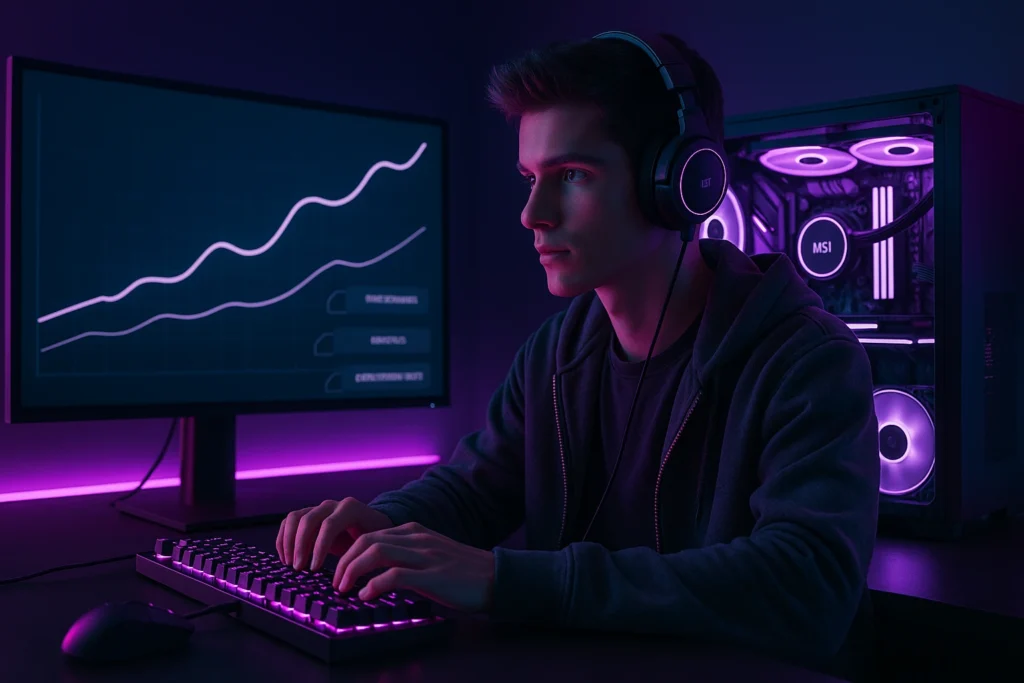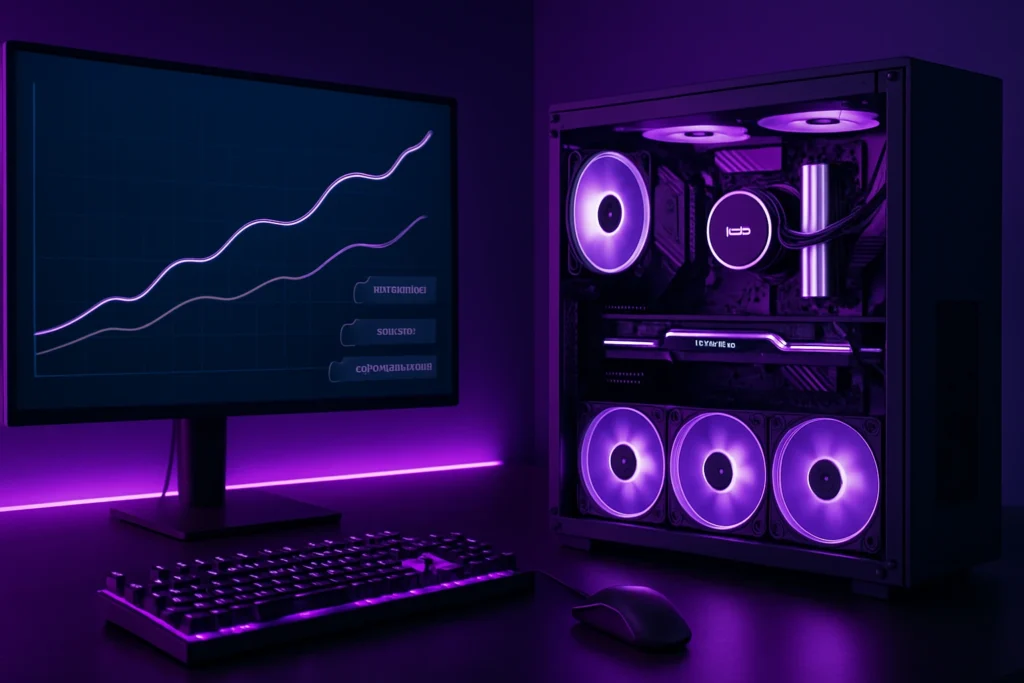PC Bottleneck Calculator
Calculate hardware compatibility and performance balance
Welcome to the most advanced CPU and GPU Bottleneck Calculator online! Whether you're a gamer, creator, or professional, finding the perfect balance between your processor and graphics card is crucial for achieving top performance. Our tool analyzes your PC components and provides precise insights to help you optimize your system, eliminate bottlenecks, and unleash the full potential of your setup.
How to Use Our Bottleneck Calculator
- Select Your CPU: Choose your processor from our extensive, regularly updated list.
- Select Your GPU: Pick your graphics card model.
- Click Calculate: Instantly view the bottleneck percentage and detailed analysis.
- Review the Recommendations: Understand if an upgrade is needed or if your components are perfectly matched.
Key Features of Our PC Bottleneck Calculator
✔ Easy-to-Use Interface – Simply input your CPU and GPU details for an instant analysis.
✔ Compatibility Check – Find out if your processor and graphics card are well-matched for seamless performance.
✔ Bottleneck Percentage Score – Receive a precise 0-100% rating to determine the severity of bottlenecks.
✔ Upgrade Suggestions – Get expert recommendations on the best upgrades to optimize system efficiency.
✔ Real-Time Analysis – Our advanced algorithm ensures accurate and up-to-date performance insights.

What is a Bottleneck?
In simple terms, a "bottleneck" occurs when one component in your PC limits the full performance of another. If your CPU is too weak compared to your GPU, your graphics card can't operate at its maximum capacity — and vice versa.
Types of Bottlenecks
- CPU Bottleneck: Your processor is slowing down your graphics card.
- GPU Bottleneck: Your graphics card is limiting the speed of your processor.
- RAM Bottleneck: Insufficient or slow memory is holding your system back.
- Storage Bottleneck: Old or slow hard drives causing delays.
Effects of Bottlenecking
- Lower frame rates in games.
- Stuttering or lag during gameplay.
- Longer rendering and processing times.
- Poor multitasking capabilities.
Components Analyzed by Our Calculator
- CPU Performance: Cores, threads, base and boost speeds.
- GPU Power: VRAM, clock speed, architecture.
- RAM: Amount and speed.
- Resolution and Quality Settings: Higher settings can shift bottlenecks.
Why Use Our Bottleneck Calculator?
- Accuracy: Real-world data and benchmarks are the foundation of our calculations.
- Ease of Use: Select, click, and view results instantly.
- Regular Updates: New CPU and GPU models are added as they release.
- Customized Insights: Recommendations tailored to your usage — gaming, rendering, or general productivity.
Example Calculation
- CPU: Intel Core i5-12400F
- GPU: NVIDIA RTX 4070 Super
- Result: Minimal CPU bottleneck (<5%) at 1440p resolution. Perfect combo for gaming and streaming.
What If There's a Bottleneck?
- CPU Bottleneck? Consider upgrading to a higher-core CPU or overclocking.
- GPU Bottleneck? Lower graphics settings or upgrade your GPU.
- RAM Bottleneck? Add more RAM or upgrade to faster modules.
- Storage Bottleneck? Upgrade to an SSD.
Pro Tips to Reduce Bottlenecks
- Match CPU and GPU generations (e.g., avoid pairing a 10-year-old CPU with a brand-new GPU).
- Prioritize higher core/thread CPUs for modern games.
- For gaming at higher resolutions (1440p, 4K), GPU bottlenecking is less critical.
- Adjust settings like shadows and textures to balance load.
CPU Bottlenecks
Occurs when your processor can’t keep up with the GPU’s processing speed. Signs of a CPU bottleneck include:
- Low frame rates in games
- Stuttering and lag
- 100% CPU usage while the GPU remains underutilized
Causes of CPU Bottlenecks
- An outdated or low-performance CPU
- Insufficient cores or threads for modern applications
- Low clock speeds
- Limited cache size
Fixes for CPU Bottlenecks
- Upgrade to a more powerful CPU
- Overclock your processor (if safe and possible)
- Close background applications
- Lower CPU-intensive in-game settings
GPU Bottlenecks
Happen when the graphics card is unable to keep up with the CPU’s processing speed. Signs include:
- Low GPU usage (under 95%)
- High GPU temperatures
- Frame drops during graphically demanding scenes
- Inability to run high-resolution settings
Causes of GPU Bottlenecks
- Outdated or weak graphics card
- Low VRAM for high-resolution textures
- Overly ambitious graphics settings
- Inadequate cooling, leading to overheating
Fixes for GPU Bottlenecks
- Upgrade to a more powerful GPU
- Lower in-game graphics settings
- Reduce resolution or use upscaling technologies
- Improve cooling solutions
- Update GPU drivers
Why Trust Our Tool?
Our bottleneck calculator is based on:
- Extensive database of real-world gaming and productivity benchmarks.
- Analysis from trusted hardware review sites.
- Consistent updates to keep up with evolving technology.
- Designed by PC builders and gamers — for PC builders and gamers.

Real-Life Examples of Fixing Bottlenecks
1. Upgrading the CPU for High-End GPUs
A user with an NVIDIA RTX 3080 and an older Intel Core i5-9400F experiences performance drops in CPU-intensive games. Upgrading to an Intel Core i9-10900K eliminates the bottleneck, unlocking the GPU’s full potential and improving frame rates.
2. Increasing RAM for Better Performance
A gamer using 8GB RAM notices stuttering in modern games despite having a balanced CPU and GPU. Upgrading to 16GB DDR4 RAM removes memory-related bottlenecks, resulting in smoother performance and better multitasking.
3. Improving Cooling for Consistent Performance
A user notices performance drops during long gaming sessions due to thermal throttling. Upgrading the cooling system (high-performance air or liquid cooling) allows components to maintain optimal performance without overheating.
Conclusion
Building a balanced PC setup doesn't have to be complicated. With our powerful CPU and GPU Bottleneck Calculator, you can easily identify and fix system imbalances, improve performance, and enjoy smoother gaming, faster rendering, and better multitasking. Stop guessing — calculate your bottleneck now and unlock the true potential of your system!
